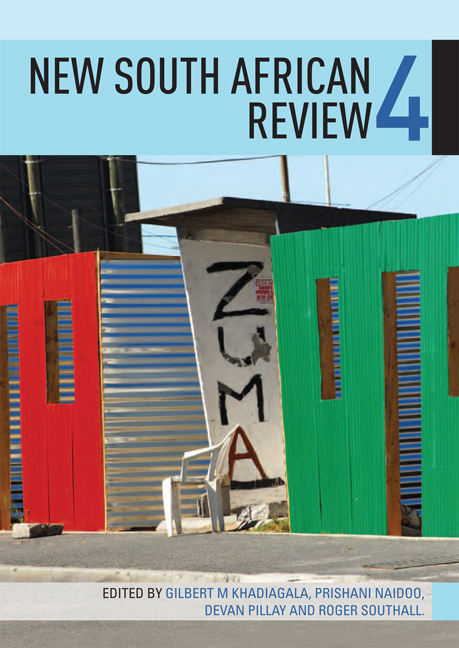Book contents
- Frontmatter
- Contents
- Preface
- Introduction: South Africa's fragile democracy: Twenty years on
- PART ONE ECOLOGY, ECONOMY AND LABOUR
- PART TWO POWER, POLITICS AND PARTICIPATION
- Introduction
- Chapter 6 Platinum, poverty and princes in post-apartheid South Africa: New laws, old repertoires
- Chapter 7 amaDiba moment: How civil courage confronted state and corporate collusion
- Chapter 8 Secrecy and power in South Africa
- Chapter 9 The contemporary relevance of Black Consciousness in South Africa
- Chapter 10 Death and the modern black lesbian
- PART THREE PUBLIC POLICY AND SOCIAL PRACTICE
- PART FOUR SOUTH AFRICA AT LARGE
- Contributors
- Index
Chapter 9 - The contemporary relevance of Black Consciousness in South Africa
from PART TWO - POWER, POLITICS AND PARTICIPATION
Published online by Cambridge University Press: 21 April 2018
- Frontmatter
- Contents
- Preface
- Introduction: South Africa's fragile democracy: Twenty years on
- PART ONE ECOLOGY, ECONOMY AND LABOUR
- PART TWO POWER, POLITICS AND PARTICIPATION
- Introduction
- Chapter 6 Platinum, poverty and princes in post-apartheid South Africa: New laws, old repertoires
- Chapter 7 amaDiba moment: How civil courage confronted state and corporate collusion
- Chapter 8 Secrecy and power in South Africa
- Chapter 9 The contemporary relevance of Black Consciousness in South Africa
- Chapter 10 Death and the modern black lesbian
- PART THREE PUBLIC POLICY AND SOCIAL PRACTICE
- PART FOUR SOUTH AFRICA AT LARGE
- Contributors
- Index
Summary
INTRODUCTION
The most obvious difference between Black Consciousness under apartheid and in the democratic era is the change in the political-legal position of black people. For the first time in four hundred years black people are in control of the country's governmental machinery and have enacted laws to prohibit racism. Section 9 of the Constitution extends equal protection under the law to everyone, and Subsection 9 (2) enjoins government to take affirmative measures to remedy the injury done to black people in the past. Steve Biko's (1972:52) definition of black people as ‘those who are by law or tradition, politically, economically, socially discriminated against as a group in South African society and identify themselves as a unit in the struggle towards the realization of their aspirations’, would therefore be anachronistic under these changed circumstances.
Although white people continue to dominate the country's economic, financial and institutional infrastructure, it would be politically implausible to speak of the ‘unnerving totality of the white power structure’ (Biko 1972:54). Social stratification within the black community also means that we cannot really sustain the idea of a solid black bloc that would confront such a ‘totality’. Instead of being huddled together with the poor and working classes, the middle classes have fled the townships at the slightest chance. Young people started forming new social relationships across the colour line in a way that was unimaginable during the days of Black Consciousness. Many of these young people have had little or no experience of apartheid or of the anti-apartheid struggle.
Biko (1972:53) wrote that ‘the interrelationship between consciousness of self and the emancipatory programme was of paramount importance’ in understanding Black Consciousness. But what happens to the black self when the emancipatory programme has been taken to its political conclusion? In what follows I argue that the absence of the political predicate – ‘all those who are by law and tradition oppressed’ – allows us to explore other aspects of Black Consciousness. In what follows I argue that Black Consciousness remains relevant in contemporary South Africa to the extent that it can:
i. foster self-reliant development among black people
ii. provide an archive for the preservation of a black cultural patrimony
iii. contribute to our conceptualisation of race
iv. provide a diagnostic tool in the ongoing battle against racism while promoting self-reliance (affirmative action is used as an example).
- Type
- Chapter
- Information
- New South African Review , pp. 167 - 181Publisher: Wits University PressPrint publication year: 2014



